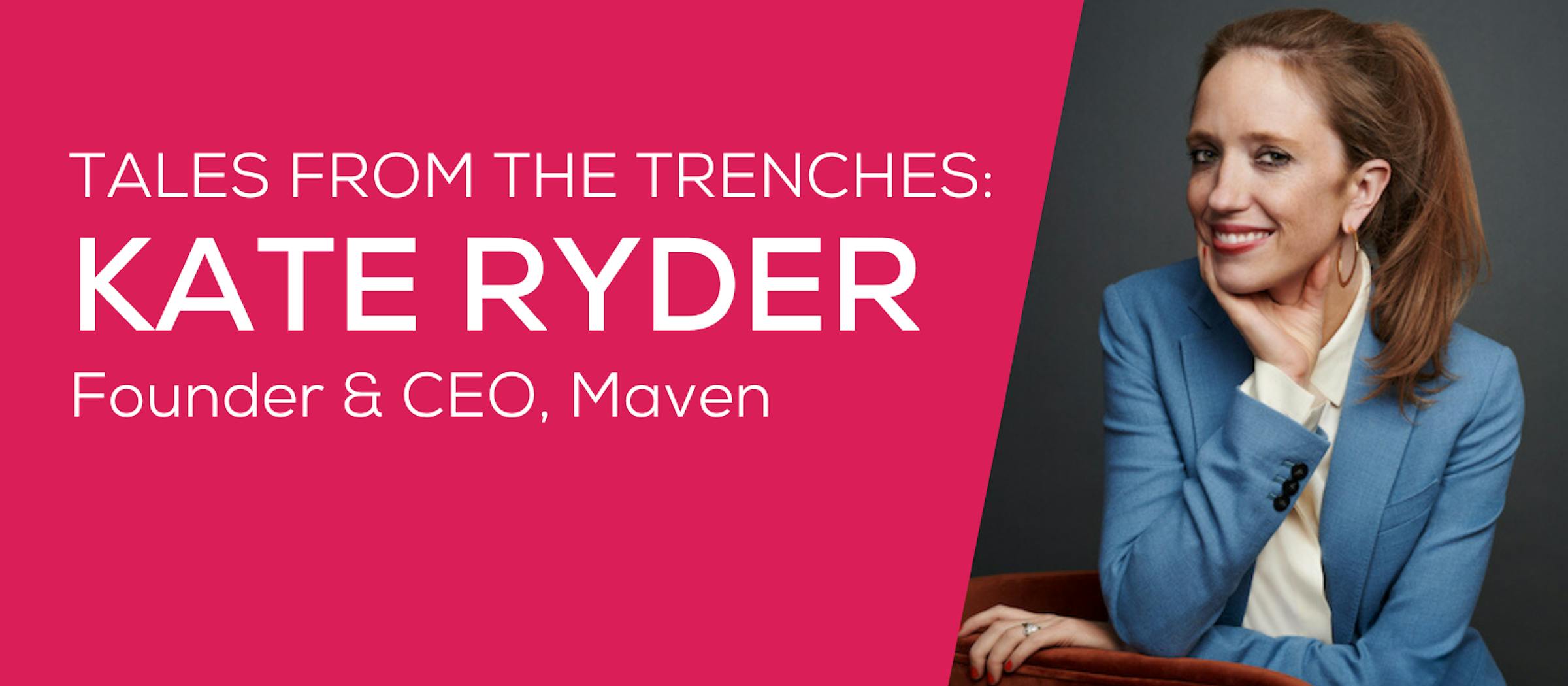Maven’s Kate Ryder shares her startup journey and advice for founders at Tales from the Trenches
Almost 80 percent of household healthcare decisions are made by women — women are most likely to take care of family members when they get sick and often guide how and when their children and families go to the doctor. However, the vast majority of digital health startups are founded — and run — by men.
It was that observation that led Kate Ryder to found Maven in 2014. Now, Maven operates the largest women’s and family telehealth network and offers custom programs across fertility, maternity, postpartum and beyond. Since Kate founded Maven in 2014, the company has raised more than $87 million in funding from investors like Reese Witherspoon, Natalie Portman and Mindy Kaling.
In a conversation moderated by VillageMD co-founder Paul Martino, Kate Ryder discussed her entrepreneurial journey, how the growth of telehealth during COVID-19 has helped Maven expand their footprint and more.
Here are our key takeaways. Responses have been edited slightly for length and clarity.
The founding story
“I think sometimes the media likes to portray founding stories as this lightbulb moment… But really Maven was born from an accumulation of a lot of different trends and personal needs that I was seeing when it came to women’s health, particularly as it related to starting a family.
“I think sometimes the media likes to portray founding stories as this lightbulb moment… But really Maven was born from an accumulation of a lot of different trends and personal needs that I was seeing when it came to women’s health.”
“I was trying on a lot of different ideas at the time. I was working in venture capital, knowing that I eventually wanted to leave and start something of my own. One of the ideas that always was consistent for me was helping either women or underserved communities… And so I started to talk to my friends and really look at my own experience and what the unmet needs were. A lot of the core needs boiled down to access: getting the right information and then accessing the right providers when you need them. At one point the ‘aha’ moment was: what if I took this part of this idea and I made an entire virtual clinic that supports a lot of women’s health needs and children’s health needs.”
Getting the business off the ground
“My aunt and my mom have a focus group business that I used to help them with. They would go to big brands and do tons of focus groups — whether it was for a new product launch or new branding — and I would write the reports. So, that’s what I did first for my own product. I held a bunch of focus groups after I had landed on the idea and tested it out. It was probably over a month of Sundays of asking tons of questions to women and providers about their needs and gaps in women’s health. And then we tested the concept of this virtual clinic [with the focus group] and asked if it was something that they would use.
“It was through these focus groups that the pitch deck came to be and I raised the first $50,000 for the business. After the focus groups, I went out to lunch with a partner from Index Ventures, which was the VC firm that I was working at. I didn’t even have a pitch deck at the time. I was just talking to him about the idea and he goes, ‘It sounds like a really great idea, count me in. I’m your first $50,000’. Between the focus group affirming that we need something like this and then suddenly having a commitment of capital, we created a real pitch deck and started fundraising to get the business off the ground.”
Investing in early employees
“In the early days, I actually only gave myself 75 percent of the company knowing that I was going to give 25 percent to early employees. Normally, employee share option pools are typically around 10 percent, so it was a large amount. And I think it was simply because I just knew I needed as much help as I could get.”
The growth of telehealth during COVID-19
“Particularly given that telemedicine is so central to our products — we run the largest women’s and family health telemedicine network today with over 2,000 providers across 20 different specialties — I think our clients and prospective clients are seeing us as an essential benefit. There has been a lot of disruption has occurred to routine maternity care or pediatric care.
“We rolled out MassHealth a month and a half ago, which is a Massachusetts Medicaid plan through the state governor’s office that was launched directly to combat and to help support all the disruptions created by COVID-19. So we’re also doing a lot of COVID specific work right now as well.”
How COVID-19 has affected pregnancy
“People are using Maven more: Utilization across our platform is up 50 percent since the crisis, but in certain segments, like mental health, it’s up 300 percent. What’s interesting on the mental health side is a lot of the spikes in mental health that we were seeing before COVID-19 occurred postpartum or when parents went back to work. But right now a lot of the spikes in mental health are for pregnant women.
“What’s interesting on the mental health side is a lot of the spikes in mental health that we were seeing before COVID-19 occurred postpartum or when parents went back to work. But right now a lot of the spikes in mental health are for pregnant women.”
“I think it’s because of the uncertainties around delivering a child right now. A lot of people are getting their routine prenatal visits canceled or pushed off. For someone coming into a pregnancy, whether they’ve had miscarriages in the past and this is their first viable pregnancy, or whether they’re high risk, they already have heightened anxiety and now they’re not able often to reach their medical professional or see them in person.
“There’s heightened anxiety on the postpartum side as well. People are being discharged in the hospital relatively quickly now. And so there’s just a lot of postpartum care and needs that are now being done virtually with remote clinical services.”
Prioritizing underserved communities during COVID-19
“One thing that we’ve seen is, given how hard hit underserved communities are right now with COVID-19, we’re actually moving faster into Medicaid and some of those areas. Before COVID-19, we thought it was going to take years to be able to start working with some of those underserved communities. I think what we’re seeing now is an openness to innovate because of the massive disruption to care, but also because some of the most vulnerable communities are getting so hard hit.
“To offer pregnancy programs to those communities, we’re looking at re-cutting some of our existing products to match their needs. We’re also just trying to be a provider. So we are offering pre-visit telemedicine to some of these communities with care advocates and helping shepherd people to the right providers with the right language or, if someone has preferences on race or gender in terms of what types of providers, finding that for them and really quarterbacking everything.”
Be efficient during times of uncertainty
“Operational efficiency is so important right now. It’s hard because we’re in a work from home environment that we’ve never been in before.
“This is a time when you should be driving operational efficiency so that you can hire 20 people and not 15 because you just aren’t being efficient internally. Just think through how to continue to scale and build…and then invest in the right growth areas. We actually just acquired a company… and that’s an important part of our long term strategy. So we’re making sure that we’re also seizing the right opportunities too.”
Advice for women in healthcare and business
“Find the confidence that you have within yourselves and then persevere.
“Find the confidence that you have within yourselves and then persevere.”
“I got so many ‘no’s’ and I still get them every day, even from my own internal team. But basically, if you know that your patients and the users of your product need the product, and the business model makes sense, just keep going. I wasn’t quite sure of those things obviously before we launched, but I would get signals from patients early on and feedback that our product helped them a lot and really mattered. If you have those stories in whatever you’re doing, just keep going, because I think the world needs more female entrepreneurs particularly.”
Find fun in your job
“My husband and I played this game where we asked each other what are the three values that we want to imbue in our children. Truly one of my top ones is teaching them how to have fun in the world, be optimistic and take lemons and make lemonade. Maven is a lot of fun. I’m having a great time building this company with the team. And so it makes the no’s, it makes the rejection, it makes some of the less glamorous parts of this, worth it and mutes it a bit. Have fun, love your team, build a great product and constantly look for ways to make lemonade out of lemons. If I can give my kids those tools, then they’ll hopefully be happy people and do something where they give back.”
Attend our next Tales from the Trenches™ with Hyperfine CMO & CSO Khan Siddiqui on June 17. Register.



